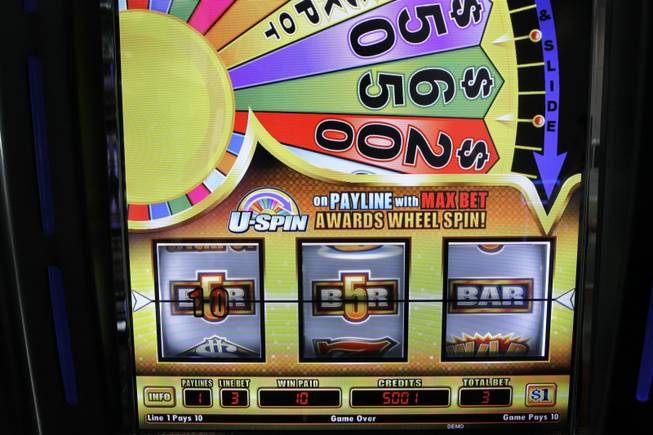
A Cash Spin slot machine by Bally Technologies is displayed in the company’s showroom Thursday, March 29, 2012.
Thursday, April 12, 2012 | 6:25 p.m.
The good news for Nevada is that it now has a strategic plan for treating problem gambling.
The bad news: State budget cuts have eliminated funding to put the plan in motion.
Bo Bernhard, executive director of UNLV’s International Gaming Institute, and Jeff Marotta, president of Portland, Ore.-based Problem Gambling Solutions, kicked off the sixth-annual Nevada State Conference on Problem Gambling Thursday with speeches assessing how Nevada is addressing compulsive gambling, an affliction that affects not only individual players, but their families.
It’s believed that 5 percent of Nevadans who gamble have addictive behavior and another 9 percent are at risk.
Marotta said that over five years, academic experts and the Nevada Council on Problem Gambling have shepherded the development of a strategic plan to treat problem gamblers.
Bernhard and a team of researchers at UNLV conducted a follow-up survey with 107 problem gambling clients in treatment to assess how well the plan was working. Researchers surveyed access to treatment services, treatment quality, counselor relations, treatment impacts and overall quality of clinical efforts. In all categories, the survey produced high marks.
“It’s pretty clear that treatment is the way to go,” said Carol O’Hare, director of the Nevada Council on Problem Gambling.
But implementing the program on a broad basis has been difficult because of state government budget cuts.
Under Nevada legislation, $2 of a fee that the state imposes on every slot machine is to be directed to problem gambling research and treatment. But in the 2011 legislative session, funds were redirected to the state general fund, and now only $1 of the fee goes to problem gambling programs.
“This (problem gambling treatment) is happening because there are a lot of heroes out there,” Marotta said. “It doesn’t make a lot of financial sense to be in this business, but many of the medical professionals are treating people and not getting paid what they should.”
O’Hare said it was hard to understand how the state could get a strategic plan in place but not fully fund it to make it effective.
“The state has poured a lot of money into this,” she said. “The effectiveness of the program has been documented. There’s only a small percentage of problem gamblers who access treatment. It’s always less expensive to society to treat instead of paying for the consequences that occur when they aren’t treated.”

Join the Discussion:
Check this out for a full explanation of our conversion to the LiveFyre commenting system and instructions on how to sign up for an account.
Full comments policy